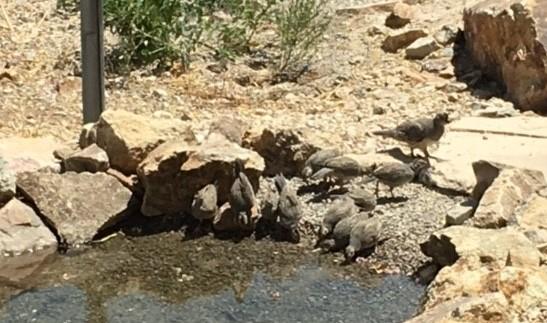Diana
Forum Replies Created
Viewing 2 posts - 1 through 2 (of 2 total)
-
DianaParticipantI live in the Mojave Desert where we don't have crows, but we do have ravens (who love to heckle my dogs!) And we do have lots of Gambel's quail who breed and winter in our area. I don't have years documented, but some of what I've noticed: The quail come to our feeder and pond year round. They pair up in March and April, and start bringing their young to us in mid May. Since they are precocial birds, the babies are mobile from day one and look like a walnut with legs. The parents both guide their young with the male keeping watch for dangers while the female helps the babies feed. Pairs may have more than one clutch in a year; the first one averages 11, but may number up to 15, and later clutches typically max out at 7 and average at about 4. We have had as many as 32 quail at our feeders at one time. There is no guarantee of breeding if the rain hasn't been favorable. One dry year we only saw one pair with one baby. That's it. The young hang around with their parents unless the female lays another clutch of eggs. Then we see the male with the babies, helping them find food while the female broods. I don't know for sure, but I think the first clutch is left to fend for themselves once the second brood starts hatching, because now the parents reunite to show the new ones around. See the picture below of one maturing family at our pond. The male was sitting watch on top of the rock in the upper right of the picture. In fall, everyone disperses, although pairs may stay together over winter. I haven't seen many groups over 4 birds come to the feeders during the winter, so I'm guessing either the young left the parents' area or they didn't survive. (Where there is prey, there will be predators.)
 in reply to: Life in a Flock #757976
in reply to: Life in a Flock #757976 -
DianaParticipantI was surprised that they live so long, although parrots also have great longevity, and they are also a remarkably intelligent group. I wonder if there is a correlation.in reply to: Crow Research Techniques #749877
Viewing 2 posts - 1 through 2 (of 2 total)
